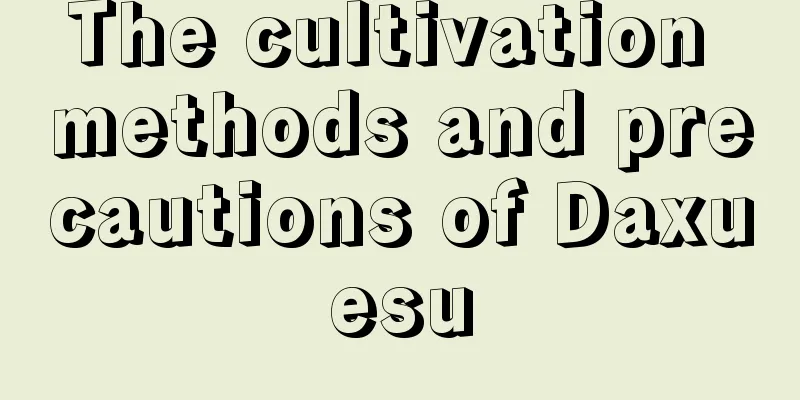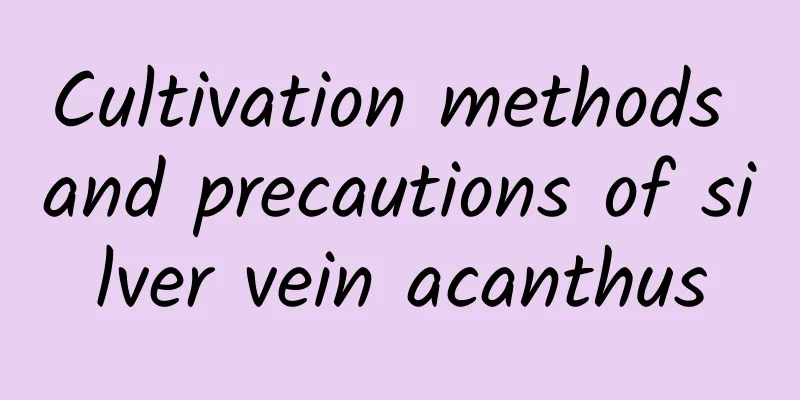When is the best time to sow eggplant?

|
Eggplant, as a popular vegetable, occupies an important position in my country's summer vegetables and is widely grown throughout the country. Not only is the eggplant fruit edible, its leaves, roots and stems also have medicinal value, so it has a very high cultivation value. Let’s take a look at when is the best time to sow eggplant? When is the best time to sow eggplant? Eggplant is an annual herb and its ideal growth temperature range is 20℃ to 30℃. Since eggplant has high requirements for water and fertilizer , it is best planted in early spring and early autumn. In spring, the eggplant planting period usually extends from the end of December to the end of February, while in autumn, the suitable planting period lasts from the beginning of July to the end of August. Key points for growing eggplant 1. Seed treatment and germination Select high-quality seeds, disinfect them with 1% potassium permanganate solution for 30 minutes, and then soak them in warm water for 24 hours. After cleaning the seeds, remove the seed coat, wrap them with wet gauze, and place them in an environment of 25-30℃ to promote germination. After about 5-6 days, most of the seeds will germinate and can be sown. 2. Land selection and preparation Choose a well-drained plot of land, preferably one in which the soil has not been used to grow Solanaceae crops before. After the land is plowed and exposed to the sun, high ridges more than 30 cm high are established. Apply appropriate amounts of quick-acting nitrogen, phosphorus, potassium fertilizers and biological organic fertilizers to ensure uniform soil fertility. One week before sowing, spray the soil with 500 times diluted pentachloronitrobenzene or dichlorodiphenyltrichloroethane for disinfection, and then cover it with a film to enhance the disinfection effect. 3. Planting seeds After the seedbed soil is prepared, mix the seeds with fine sand to ensure even sowing. After sowing, cover with a thin layer of soil and water thoroughly. During the seedling stage, pay attention to keeping the soil temperature not lower than 17℃. 4. Planting When the seedlings grow 4 true leaves, select the healthy seedlings for transplanting. Apply sufficient base fertilizer to the soil, including well-rotted farmyard manure and appropriate amount of microbial fertilizer , establish 50-70 cm high ridges, and keep the plant spacing at 30-40 cm. Water thoroughly after planting. 5. Fertilizer and water management Base fertilizer should be applied during land preparation, with 1.5 tons of decomposed organic fertilizer, 25 kg of urea and 100 kg of compound fertilizer applied per mu. After transplanting, apply fertilizer twice according to the growth of the plants. Be careful not to apply too high a fertilizer concentration to avoid excessive growth and falling flowers and fruits. During the pollination period, if the plants are not short of water and fertilizer, no additional fertilizer is needed. After fruiting, apply 30 kg of urea and 50 kg of compound fertilizer per mu of the pit to promote fruit growth. Apply top dressing two or three times during this stage. Stop fertilizing when the fruit begins to change color and keep the soil moderately moist. The above is an introduction to the planting time and key points of eggplant. When planting eggplant, you should also choose suitable varieties. It is best to choose according to the local market.
|
<<: Can the Weeping Guanyin be grown in water? How to cultivate it in water?
>>: Key points for cutting of Dripping Guanyin, when is the cutting time?
Recommend
How to grow a potted welcoming pine? How to grow a potted welcoming pine?
Cultivation method of Welcoming Pine potted plant...
What are the cultivation methods and precautions for glass begonia flowers?
Glass Begonia Introduction Glass begonia belongs ...
To plant succulent plants in pots, just rely on this 10-word mantra and they will grow quickly and fill the pots!
Remember this 10-word formula, and you will get a...
Is Datura poisonous? Pictures of Datura flowers
1. Is it toxic? It is an annual plant belonging t...
How long does it take for Clivia to grow new buds after wiping its head?
1. How long does it take to grow new sprouts? Und...
Symptoms of Sunflower Nutrition Deficiency
The root cause of sunflower nutritional deficienc...
Can hyacinth be grown hydroponically?
Can hyacinth be grown hydroponically? Hyacinth ca...
Can wintersweet branches survive by grafting?
1. Can be inserted Cutting is one of the main met...
What to do if the flowers wilt?
1. Improper watering Reason: Although the plant i...
What to do if the leaves of the peace lily have spots
1. Getting sick In fact, it can get sick due to e...
Will green radish attract ghosts?
1. It won’t attract ghosts Green ivy will not att...
The Flower Language and Legend of White Clover
Flower language of white clover We often give spe...
Where is the most auspicious place to put the lucky tree in the house?
1. Living Room The environment of the living room...
What to do if Anthurium loses its leaves
1. Improper watering If there is too much water, ...
How to deal with root rot of Clivia
Causes of root rot Unsuitable environment When th...









